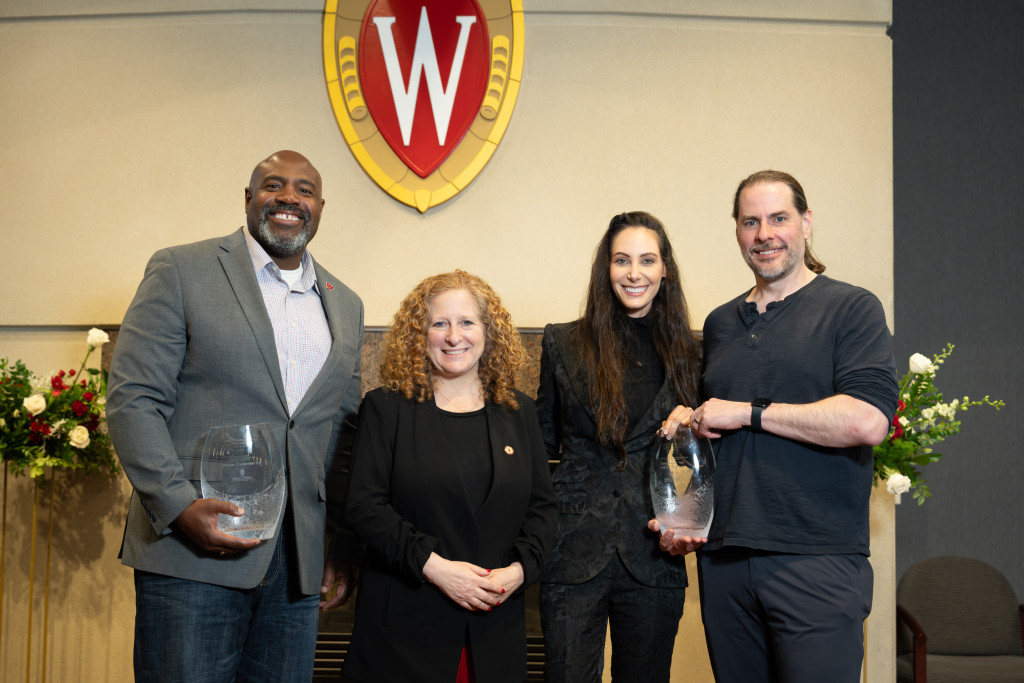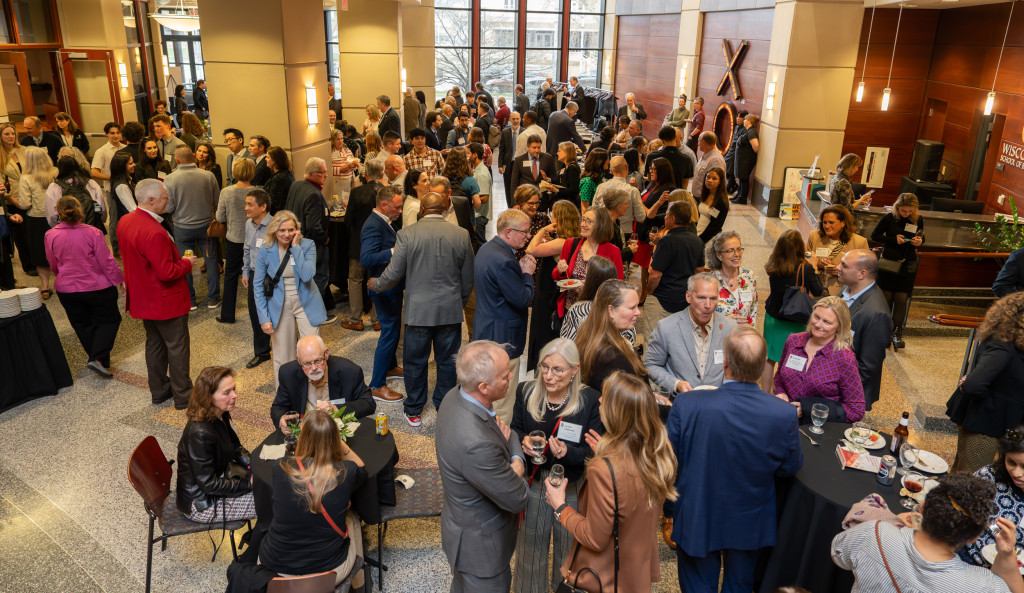Entrepreneur award winners turn ideas into impact — from farming to fashion to fusion

Chancellor Jennifer Mnookin, second from left, poses with winners of the Chancellor’s Entrepreneurial Achievement Award. From left to right, Marcus Carpenter, Chancellor Mnookin, Heather Hasson and Greg Piefer. Photo by Clint Thayer/Focal Flame
The University of Wisconsin–Madison Office of the Chancellor, in partnership with the Wisconsin Foundation and Alumni Association, today recognized Marcus Carpenter, Heather Hasson, and Greg Piefer as recipients of the 2025 Chancellor’s Entrepreneurial Achievement Award.
“What unites this year’s outstanding honorees isn’t what they do — it’s why they do it,” said Chancellor Jennifer L. Mnookin. “Each has taken a distinct path into entrepreneurship, yet all are driven by the same purpose: to improve lives and expand opportunity. That’s the Wisconsin Idea in action.”
Established in 2011, the Chancellor’s Entrepreneurial Achievement Award recognizes UW–Madison innovators and alumni who have contributed to economic growth and the social good, serving as entrepreneurial models for the UW community and inspiring the campus culture of entrepreneurship.
Meet this year’s honorees:
Marcus Carpenter ’00
Founder, Route 1, Twin Cities, Minnesota
As a fullback for the Badgers, Marcus Carpenter once ran plays on the field. Now he’s ensuring greater access to fields for farmers throughout Minnesota and beyond.
As the founder of Route 1, a Minnesota-based resource hub for Black, Brown, and Indigenous farmers, Carpenter helps farmers cultivate profitable agricultural enterprises and offers support in land acquisition, agribanking, equipment access, and farm-share distribution — all while also addressing food insecurity in communities that most need access to fresh food.
“Route 1 is not just about food production,” Carpenter said. “It’s about community healing, generational wealth, and equity in a system that hasn’t always welcomed folks who look like me.”
Carpenter’s passion is rooted in family history: his great-grandfather owned the largest Black-owned farm in Poinsett County, Arkansas and the company name, Route 1, is an homage to the single road that connected the houses, farms, and even churches of his great-grandparents’ 18 children – and still connects their children’s children.
Today, Carpenter’s version of Route 1 partners with organizations like the USDA, The Toro Company Foundation, and the Bush Foundation to connect farmers of color with essential resources while bringing fresh, locally grown produce to underserved communities facing food insecurity.
A former fullback during the Badgers’ back-to-back Rose Bowl run in the late 1990s, Carpenter holds degrees in sociology and behavioral sciences and law, with a certificate in criminal justice. He has led strategic initiatives at companies ranging from the NBA to Philip Morris USA, and was named one of the Top 50 Black Leaders to Know in Minneapolis–St. Paul by the Business Journal in 2024.
Carpenter proudly sports his Badger gear wherever he goes because his UW–Madison experience continues to fuel his mission. “Being part of the Badger community has granted me access to an extensive network of people who share my passion to impact people and create positive change,” he says. “Wherever I go, I proudly display the ‘W’.”
Heather Hasson ’04
CEO & Co-Founder, OOG.Health; Co-Founder & Executive Chair, FIGS, Santa Monica, California
It all started with a cup of coffee.
Heather Hasson was catching up with a friend—a physician assistant — who described working long, grueling shifts in scrubs that were boxy, scratchy, and ill-fitting, with the size printed in bright orange on the outside of the collar. She was horrified. While designers catered to athletes and athleisure fans, the healthcare professionals she idolized had been completely overlooked.
She decided to rectify that oversight. With a background in fashion as a former handbag designer, Hasson launched FIGS in 2013 and set out to revolutionize the healthcare apparel industry for people she regularly refers to as “Awesome Humans.”
It didn’t take long. By 2021, FIGS was valued at more than $5 billion and became the first company led by two female co-founders to go public.
“Her whole ethos is ‘create the world you want to live in,” FIGS co-founder Trina Spear said. “She has endless ideas to make change and make a difference, and it’s just so inspiring to be around that.”
Hasson is every bit as much of a philanthropist as she is an entrepreneur. FIGS donates scrubs to clinicians in under-resourced communities around the globe (more than 325,000 sets and $500,000 in 2024 alone) and to medical professionals during disasters in the United States as well. During Covid-19, FIGS made KN95 masks available free of charge on its website for front-line workers. And long before Hasson broke into healthcare apparel, she was ensuring kids in Africa and Vietnam had the uniforms required so they could attend school.
Today, FIGS also regularly advocates on behalf of healthcare workers on Capitol Hill, and Hasson’s latest venture, OOG.Health, is a continuing education platform that helps busy healthcare professionals earn the credits they need to stay current by utilizing AI in the evaluation process. It, like everything else she does, is designed to improve the quality of life for her “heroes.”
“She’s very passionate about Wisconsin and very passionate about the Badgers,” Spear said. “She is one of a kind. I think her time at UW–Madison helped her gain confidence in her own abilities and her own perspectives and really chart her own path.”
A UW–Madison political science graduate, Hasson was recently recognized as one of the Most Exceptional Entrepreneurs at the 2024 Builders and Innovators Summit, a top 100 Most Intriguing Entrepreneurs by Goldman Sachs’ in 2018 and 2019, and Ernst & Young’s 2018 Entrepreneur of the Year. She has also received UW–Madison’s Forward under 40 Award and been honored as Inc. Magazine’s Top 100 Female Founders.
Greg Piefer ’99, MS’04, PhD’06
Founder & CEO, SHINE Technologies, Janesville, Wisconsin
Just down the road from UW–Madison, Greg Piefer is quietly building one of the most ambitious energy companies in the world.
In Janesville, a city now known for atomic particles as well as auto parts, Greg Piefer’s SHINE Technologies is advancing cutting edge solutions for healthcare, clean energy, and national security — all through nuclear fusion. But that’s only the beginning. Piefer’s ultimate goal? Affordable and sustainable fusion energy.
“He is motivated by making a difference,” former Speaker of the House Paul Ryan said. “And because of him, Janesville is serving a greater purpose in that we’re solving a lot of society’s big problems.”
Motivation like Piefer’s doesn’t just appear. It’s born of relentless curiosity. He was the kid with his nose in a book, even at recess. He was especially obsessed with space travel, energy generation and other high-tech human frontiers.
At UW–Madison, that focus crystalized into purpose. He would regularly watch train cars carrying heaps of black coal rumble past, destined for the campus heating plant. He knew there was a better way. Only a few of those same cars, filled with fusion fuel, could power the entire country with no adverse climate impacts. The question was how.
Piefer was undaunted. “I wanted to play a direct role in creating that future,” he said. “I’ve always been a dreamer. I’ve always believed we can do really hard things. And I’ve always tended to see the path forward as opposed to the difficulties.”
That path started first, as all great discoveries do, with a question. It became an experiment that morphed into Piefer’s graduate research. Finally, he perfected the processes and spun off his inventions into a company. Today, SHINE has more than 300 employees and uses fusion-based technology originally patented through the Wisconsin Alumni Research Foundation.
Piefer and SHINE are currently focused on a four-phase strategy to first commercialize near-term technologies on the way to generating fusion energy: industrial neutron testing to inspect aerospace and defense components; medical isotope production to address global shortages of materials used in cancer and cardiac care; nuclear waste recycling to reduce environmental and security risks; and ultimately, generating clean, abundant and affordable fusion energy.
With recent federal grants and private investment, Piefer is closer than ever to that long-ago vision he had as a UW–Madison graduate student to heal, protect and power the world with sustainable energy.
He’s still driven by curiosity, but also by an “excitement to level up humanity.”
“That’s no less than the opportunity we have,” he said. “Those words are not too big. And I think it’s going to be hard. [But] I see a company that has a really awesome culture and that’s providing real value. We’re looking backward at the value we created while looking forward, too, at what’s next and with enthusiasm for a better world.”
With more than 20 years of experience in commercializing scientific breakthroughs, Piefer holds multiple patents and three UW–Madison degrees — including a PhD in nuclear engineering and engineering physics with a minor in medical physics.
“We’ve chosen some of the most difficult things to do on earth,” Piefer said, “But I tend to see the way forward and discount the difficulties. You have to, I think, to be an entrepreneur, or you just wouldn’t do it. “
The Chancellor’s Entrepreneurial Achievement Awards continue to spotlight UW–Madison alumni whose work embodies innovation for the public good — in communities throughout Wisconsin and countries around the world.

A crowd gathers at the Grainger Hall Plenary Room to honor the winners of the 2025 Chancellor’s Entrepreneurial Achievement Awards.




